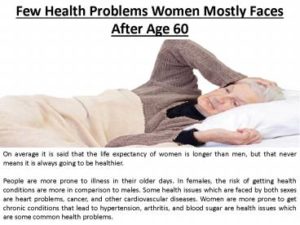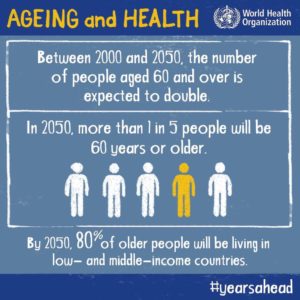- Arthritis. Arthritis is more common among adults aged 65 years or older, but it can affect people of all ages, including children. …
- Diabetes. …
- Oral Health. …
- Hypertension. …
- Dementia.
- hearing loss
- cataracts and refractive errors
- chronic obstructive pulmonary disease
- depression
Older adults are disproportionately affected by chronic conditions, such as diabetes, arthritis, and heart disease. Nearly 95% percent have at least one chronic condition, and nearly 80% of have two or more.
More than one out of four older adults falls each year. 3 million adults 65+ are treated in emergency departments for unintentional fall injuries each year.
People worldwide are living longer. Today most people can expect to live into their sixties and beyond. Every country in the world is experiencing growth in both the size and the proportion of older persons in the population.
By 2030, 1 in 6 people in the world will be aged 60 years or over the World Health Organization states.
What can you do about this?
1-Stay Active:
Exercise lowers your risk of heart disease, type 2 diabetes, high blood pressure, and some cancers, and that powerful effect leads to something experts call “compression of morbidity.” It essentially means you stay healthy longer in your late years, as compared with someone who spends the final five or 10 years of life battling chronic illness.
Exercise is also one of the best things you can do to help prevent dementia and other cognitive changes. You don’t have to kill yourselt in a workout environment for a long time or in anything. Once you’re cleared by your doctor, aim for at least 30 minutes of physical activity most days of the week.
2-Diet:
We can always improve our diet. There are all sorts of plans out there to help you lose weight, but it’s not only about dropping pounds. There is the Mediterranean-style diet for anyone hoping to avoid dementia as well as minimize other health risks. It’s high in fruits, vegetables, whole grains, olive oil, and fish, and low in meat, sugar and processed foods—all to help your cells function better.
Spring is the season of new life, and this includes many fruits and vegetables that come back into season in springtime. Produce like asparagus, cucumbers, radishes, peppers, sweet potatoes, and strawberries, just to name a few, all are in season in the spring. As so many varieties of fruits and greens are available again, this makes spring the perfect time to easily find fresh and organic foods to incorporate into your diet. Making changes to your diet can have long term positive effects on your overall health. Consider swapping out processed foods for fresh ingredients, limiting red meat, and incorporating sources of healthy fats like avocado or fish. Making these changes and eating seven to 10 servings of fruits and vegetables each day can help reduce your risk of chronic illnesses like heart disease, diabetes, cancer and dementia.
Always check with your doctor about changing your diet and activity changes you want to make!
Now spring has arrived! It is especially important to stay hydrated. With aging, the ability to notice thirst may begin to decline. This means that it can be difficult for seniors to drink enough water and prone to dehydration. Drinking water throughout the day is the best way to stay hydrated, but this can be difficult to remember to do or for those who prefer flavored beverages. A couple of tricks to make it easier for you to increase your water intake are to carry a water bottle with you and try adding fresh or frozen fruit to add a boost of flavor. Dehydration can make you more vulnerable to fatigue as well as memory loss or poor concentration. You can further boost your daily water intake by eating foods that are rich in moisture, like watermelon or cucumber.
A simple way to calculate how much water you need to drink each day is to take half your body weight and drink that amount in ounces of water.
Ex. Let’s say the weight is 185lbs and that divided by 2 is 92.5 lbs and now x 16 oz=1480ml of water a day. 1.5 ml/day and you always check with you primary doctor!
3 Good Sleep:
Lack of sleep impacts your memory, emotions, weight and even your appearance. The older you get, the harder it can be to fall and stay asleep, but you still need the same amount of hours.
Older adults need about the same amount of sleep as all adults—7 to 9 hours each night. But, older people tend to go to sleep earlier and get up earlier than they did when they were younger.
According to the National Sleep Foundation, most sleep problems are a result of snoring, medication side effects and underlying medical conditions, such as acid reflux, depression and prostate problems. Addressing those issues with your doctor is a good start. You can also enjoy more satisfying sleep by creating a calming space, dedicating enough time for sleep and practicing relaxation techniques.
Breaking the old habits can be hard, what can you do?
Breaking old habits and creating new ones can be hard, but health changes are key to continue healthy and independent living. Consider quitting smoking, drinking alcohol less and eating more nutrient-dense foods to improve physical health. You need to prioritize what your goals are. To either loose more weight, get more active, or whatever the key is disciplining yourself with rewarding yourself in return at first which is reaching closer to your goal=SUCCESS. If you need to loose weight change your diet for the better. Increase your activity with exercise and daily activities of living increase. Exercise can be 30 minutes a day. It probably won’t happen over night but don’t expect results over night, like most things it takes some time. Stress and mental health also largely impact health and quality of life. Try picking up a new hobby, being more social and keeping an organized and tidy living space to boost your moods and encourage calmness. In order to help you stay consistent and create new habits, set clear goals for yourself and practice consistency. Try sharing your goals with a caregiver, friend or family member to cheer you on and hold you accountable and help push you. In time these changes will be something you want to do. When you loose the weight treat yourself now and than as a reward!
You may just love the results in what you find in time; your goal achieved and your in better health lessening your chance of disease!!
Remember to always check with your MD when you make changes in diet or activity that the MD approves who knows your health status better than anyone else!



